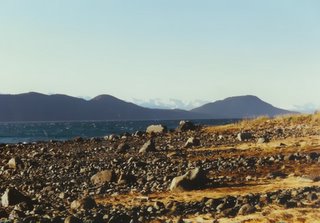Are "processor quotas" colonialism?

The Declaration of Independence refered to "a candid world," in who it was making it's statements to. With our getting 550,000 hits in the first 45 days of 2006, these commentaries certainly go out to a candid world.
This picture I took on the North shore of Douglas Island always spoke "reflection" to me.
You wouldn't believe all the countries that view this site. SiteMeter shows where your readers are on a map of the world. But look at this statement in regard our assertion that the North Pacific Fisheries Management Council is out of control and working in cross purposes to the will of the people of Alaska, notwithstanding a very few fishermen that stand to gain a lot of money by going along with them.
"But that is only a small part of the evidence of our colonialism under the American flag. Let us submit more facts to a candid world.
First, let us ask, what is a colony? And let us answer that question.
A colony has been defined in a standard college text-book by a Columbia University professor as "a geographic area held for political, strategic and economic advantage."
That, as the facts will show, is precisely what the Territory of Alaska is--"a geographic area held for political, strategic and economic advantage."
The maintenance and exploitation of those political, strategic and economic advantages by the holding power is colonialism.
The United States is that holding power.
Inherent in colonialism is an inferior political status.
Inherent in colonialism is an inferior economic status.
The inferior economic status is a consequence of the inferior political status.
The inferior economic status results from discriminatory laws and practices imposed upon the colonials through the superior political strength of the colonial power in the interest of its own non-colonial citizens.
The economic disadvantages of Alaskans which in consequence of such laws and practices redound to the advantage of others living in the states who prosper at the expense of Alaskans--these are the hall-marks of colonialism."
These comments were included in a speech by Alaska's delegate to Congress, the Honorable Bob Bartlett, in pre-Statehood days. They used to call these guys "honorable" for a reason. Anyway, compare running roughshod over the fishermen and communities, who make up the population of coastal Alaska, to this description of colonialism.
Irregardless of M-S Fisheries Act attempts to include the public comment, it's hardly a protection for the people. And it is a far cry from democracy. It is no secret that many of the Councilors minds are made up in advance of the public hearings. Not to mention their economic advice, that seem to many as engineered, and who have a lot of evidence to support the notion.
The persecuted don't have to take it. They do have to speak up though. I don't speak for anyone but myself. Leaders of fishing groups don't speak for anyone but themselves and maybe a handful of others they talk to. It kills me when I see leaders of these groups repeatedly say how many dozens of groups they represent. You know how easy it is to type in a group name on your membership list. This isn't democracy either. A far superior democracy for fishermen is the Regiona Seafood Development Association: a non-profit corporation that is fully visible.
Getting the truth out to "a candid world" and letting people elect leaders that think like them is democracy. It's going to be interesting to see what Gubanatorial candidates in Alaska have done their fisheries homework. Check out Alaska Public Radio Network on March 16 from 7 to 9 Alaska time. I guarantee that any candidate that is for giving away the jobs of fishermen and the lifeblood of communities, in doling out living resources, won't dare show up. Or supporting the export of our fish resources for pennies on the dollar rent to Alaskans.
One last thought, the Magnuson Act might work better for communities in the contiguous 48 states, but not in Alaska where it's so easy to justify to the less diligent that fish needs to be shipped out in the round. And caught by just a few. I'd be willing to bet that if any bigger king crab trap would have worked better, crab "rationalization" would have given the big operators those too.
Maybe big money snuck up on Alaskans on crab "rationalization," but at least it won't sneak up on Alaskans on any more gifting of natural resources to themselves. And without any royalty payments to the public either, like in mining and oil. Doesn't that sound like coastal colonialism?


<< Home